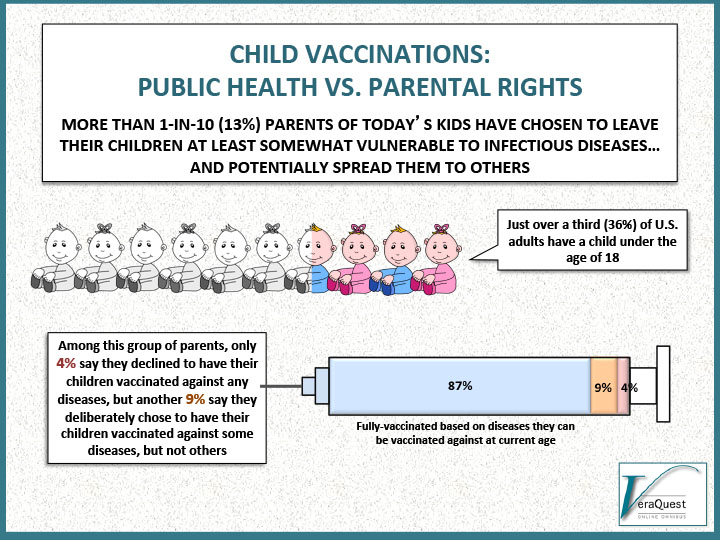“Thanks, Anti-Vaxxers…” Headlines like this seem to be abundant on social media these days. They precede a story or report on some new outbreak of an infectious disease that had been declared “eradicated” by the CDC many years ago. Take the case of the recent measles outbreak at Disneyland, for instance. Nine people contracted the measles after visiting Disneyland, most of whom had not been vaccinated against the disease. But the worst part is that two infants who were simply not yet old enough to be vaccinated are among those infected (the disease is very dangerous for infants). These babies and their parents are suffering as a result of people who had decided not to have their kids vaccinated. It’s really rather unfortunate.
Curious to better understand opinions in this arena, we included some questions regarding child vaccinations on a VeraQuest omnibus survey fielded towards the end of 2014. First, let’s think about the size of the population we’re talking about here. Just over a third (36%) of U.S. adults have a child under the age of 18. Among this group, only 4% say that they declined to have their children vaccinated against any diseases. But another 9% of parents say that they deliberately chose to have their children vaccinated against some diseases, but not others. So that’s 13% — more than 1-in-10 – of parents of today’s kids who have chosen to leave their children at least somewhat vulnerable to these infectious diseases… and potentially spread them to others. That number is a little higher than I might have expected.
So do Americans think vaccinating your children should be a requirement? Well, the majority do think vaccinations should be required, but it’s not a large majority (60%). Two-in-five (40%) feel parents should be able to make their own decisions regarding their children’s vaccinations.
We see a few interesting demographic differences on this issue:
- Americans 50+ years of age are much more likely to feel vaccinations should be required, compared to their younger 18-49 year old counterparts (69% vs. 52%, respectively).
- More women than men feel vaccinations should be required (63% of women vs. 56% of men).
- The “require vaccinations” sentiment is echoed most loudly in the South (64%), while fewer feel this way in the Midwest (55%) and West (57%).

In next week’s blog, we’ll take a look at Americans’ deeper attitudes and perceptions regarding vaccinations – for example, whether people believe vaccines can cause autism, and whether they believe that the human body can build natural immunity without vaccines, rendering some vaccines unnecessary. You might be surprised…
Do you think the protection offered by vaccines outweighs the risk of potential side effects? Do you feel there should be some sort of accountability for parents who do not vaccinate their children, if those children get sick and pass a dangerous disease onto others – i.e., should those parents be liable?
Leave a Reply